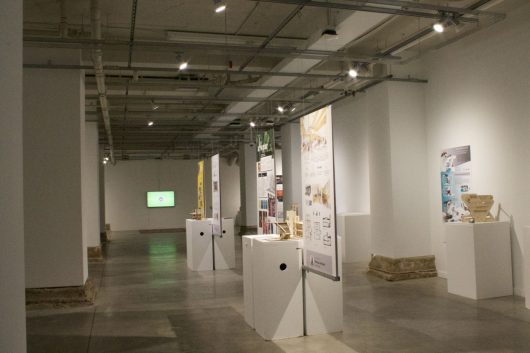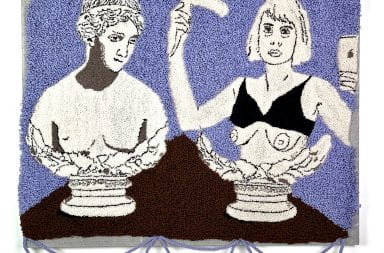
The Urban Arts Space hosted its third installment of “From the Language of Ash,” by Hanif Abdurraqib. Credit: Jillian Fountain | Lantern Reporter
On May 7, the Urban Arts Space at Ohio State hosted its third installment of “From the Language of Ash,” a poetry reading series presented by Hanif Abdurraqib.
To open the night, members of the Coalition to Free Masonique Saunders handed out information and spoke to the audience about her case. Saunders was arrested in December 2018 when her boyfriend, Julius Tate Jr., was shot and killed by police during an undercover operation in Columbus.
As an accomplice to Tate’s alleged crimes, Saunders was also charged with his murder under Ohio’s controversial felony murder rule, according to an article in the Columbus Dispatch. The coalition has organized protests, petitions and donations to help Saunders fight those charges.
“We need to keep the pressure on as long as we can,” Blizzard Wilcher, a member of the coalition, said. “They’re afraid of us and the power we have, and it’s important to remember that.”
Abdurraqib said he doesn’t consider himself an activist, but does want to leverage his platform and resources to move causes like Saunders’ forward.
Abdurraqib is an award-winning poet, author and critic who was born and raised in Columbus, and has long been passionate about the creative side of the city, he said.
“My dad played drums with Tony West and African drummers, and I came up listening to J. Rawls,” he said.
The Urban Arts Space and Abdurraqib collaborated to make his readings more accessible to the Columbus community.
“I wanted to make a reading where someone could wander in off the street and find something they love,” Abdurraqib said.
Abdurraqib said he wanted to amplify newer artists of color at the readings and asked poets Natalie Scenters-Zapico and Tyree Daye to perform.
Scenters-Zapico was raised in the dual cities of Juarez, Mexico and El Paso, Texas.
“The border wall went up when I was in college,” she said.
As a result, Scenters-Zapico’s hometown was cut in half. She said that many people from the area claim both cities, as they reject the forced duality placed upon them by governmental lines. Her first book of poems, “The Verging Cities,” won many accolades, including the PEN/Joyce Osterweil Award for Poetry.
In her second book, “Lima :: Limón,” Scenters-Zapico engages with her heritage to deconstruct duality. She said the inspiration for the title comes from the fact that in different Latin American countries, the terms for lemon and lime are completely interchangeable. In many instances, her poems are intertwined with imagery and metaphors of food.
Selections she read from “Lima :: Limón” tackled topics including the Los Zetas cartel, expectations of femininity and abuse in undocumented communities.
Daye, the headlining poet, is from Youngsville, North Carolina, and recently won the Whiting Award, a recognition given to emerging writers.
Daye read a selection of poems from his first book, “River Hymns.” He wrote about growing up in a small former tobacco town in the South, swimming in the Neuse River and playing on dirt roads. Most of all, he wrote about his family.
“Lot of dead grandmother jokes because that’s my obsession,” he said.
Daye said he grew up on his mother’s stories about his grandmother, who passed away when he was 4 years old. Those stories created a mythos around his grandmother and he now carries it on in his work.
Daye also said he subscribes to “Limbo Time,” a concept by which one needs to loop back in time to go forward. He said he observes this in his work, using history as a lens to interpret the present.
Daye’s second book, “Cardinal,” is scheduled for publication in 2020. It focuses on ancestry and the Great Migration, where an estimated 6 million African Americans left the South in the early 20th century to join the industrial revolution in the Northeast and Midwest, according to the Census Bureau.
Abdurraqib said he wanted to bring in poets who could enhance and participate in conversations with the community. Past poets include Nabila Lovelace from Queens, New York, and Emily Jungmin Yoon, who was born in Busan, South Korea.
“For every reading, I try to have a community element,” Abdurraqib said. “OSU writers opening up, or bring in activists to talk. I’m trying to hone in on things that feel very important to me.”
“From the Language of Ash” will return in October. More information on the Coalition to Free Masonique Saunders can be found at https://freemasonique.home.blog/.


